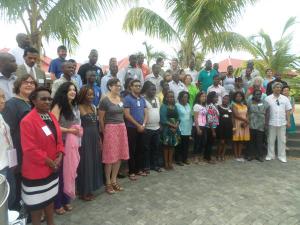 African School of Internet Governance 2014The Association for Progressive Communications (APC) and the NEPAD Planning and Coordinating Agency (NPCA) are pleased to announce the call for applications for the third African School on Internet Governance .
African School of Internet Governance 2014The Association for Progressive Communications (APC) and the NEPAD Planning and Coordinating Agency (NPCA) are pleased to announce the call for applications for the third African School on Internet Governance .
Have you ever thought about the massive and significant role that the internet plays in the world? Even in Africa, where connectivity is still not nearly sufficient, the internet touches on multiple aspects of daily life: personal, business and government communications all make use of the internet in one way or another. This adds new dimensions and challenges to privacy, security, human rights, women’s rights, and surveillance, to mention a few. These are issues that are not new to the realm of governance, but dealing with them online has changed the dynamics.
Through learning and knowledge sharing, the African School on Internet Governance (AfriSIG) aims to build a multidisciplinary cadre of African expertise in internet governance. The School will bring together a diverse group of professionals from government, business, academia and civil society who are interested and involved in internet policy and development. The School prides itself in offering a world-class learning environment, with a faculty that has the experience and expertise to convey both practical and theoretical knowledge. AfriSIG graduates will better understand internet governance from a public interest perspective, have a grasp of internet policy processes and institutions, and be able to engage more effectively in national, regional and international processes and networks.
The dates and venue of the school will be confirmed by the end of May 2015.
Who should apply?
The school is intended for leaders and professionals who are already working in ICT or internet policy and regulation from:
- Government ministries and departments, national and regional communications regulatory authorities, and public sector information and communications services such as public libraries.
- Parliamentary portfolio committees that deal with communications issues.
- Network operators, service providers and other businesses who form part of the internet industry.
- Civil society and non-governmental organisations who interact with or operate in the internet-related information and communications sector.
- Human rights institutions dealing with internet issues, such as national or regional human rights commissions.
- Community-based information and communications services and the broader community informatics sector.
- The judiciary and other members of the legal community working with internet and communications law.
- Members of law enforcement agencies who deal with internet issues.
- The internet technical community.
- Academic and research institutions that deal with internet issues.
- Media organisations and outlets that focus on the internet.
What will be covered?
- History and overview of internet governance
- Internet and communications policy and development
- Human rights-related issues
- Internet standards and protocols
- The domain name and numbering system
- Multistakeholder approaches to internet governance
- Regional, national and international institutions involved in internet policy and regulation
- Topical issues such as the so-called “right to forget”, feminist principles of the internet, net neutrality, the African Convention on Cybersecurity, and the African Declaration on Internet Rights and Freedoms.
Successful applicants will be provided with a return economy class ticket, accommodation, meals and course materials. Participants or their employers will have to cover the costs of visas and local transport (to their nearest airport).
To apply please complete this form by Friday, 22 May 2015. For more information contact Dr. Towela Nyirenda-Jere at towelan@nepad.org and Yolanda Mlonzi at afrisig@apc.org.